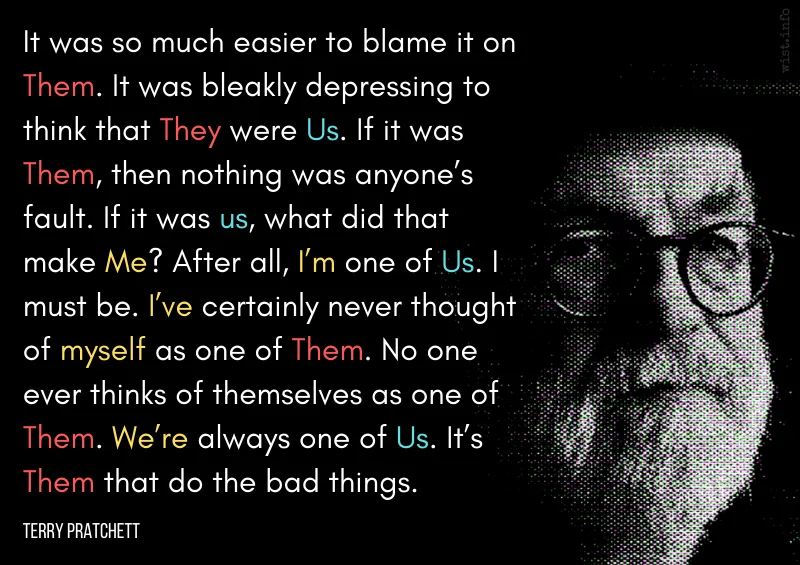A maxim for the twenty-first century might well be to start not by fighting evil in the name of good, but by attacking the certainties of people who claim always to know where good and evil are to be found. We should struggle not against the devil himself but what allows the devil to live — Manichaean thinking itself.
Tzvetan Todorov (1939-2017) Bulgarian-French historian, philosopher, literary critic, sociologist
Hope and Memory: Reflections on the Twentieth Century, ch. 5 “The Past in the Present” (2003)
(Source)
Paraphrased variant:We should not be simply fighting evil in the name of good, but struggling against the certainties of people who claim always to know where good and evil are to be found.
Quotations about:
demonization
Note not all quotations have been tagged, so Search may find additional quotes on this topic.
Life’s easier when you can write off others as monsters, as demons, as horrible threats that must be hated and feared. The thing is, you can’t do that without becoming them, just a little.
It is tempting to say that a Nazi murderer is beyond the pale of understanding. […] Yet to deny a human being his human character is to render ethics impossible. To yield to this temptation, to find other people inhuman, is to take a step toward, not away from, the Nazi position. To find other people incomprehensible is to abandon the search for understanding, and thus to abandon history.
Timothy Snyder (b. 1969) American historian, author
Bloodlands: Europe Between Hitler and Stalin, “Conclusion” (2010)
(Source)
Once we have labeled someone as “evil” there is often no limit to the cruelty and violence we can feel justified in administering to him ….
It was so much easier to blame it on Them. It was bleakly depressing to think that They were Us. If it was Them, then nothing was anyone’s fault. If it was Us, what did that make Me? After all, I’m one of Us. I must be. I’ve certainly never thought of myself as one of Them. No one ever thinks of themselves as one of Them. We’re always one of Us. It’s Them that do the bad things.
The Lord created us in His image and likeness, and we are the image of the Lord, and He does good and all of us have this commandment at heart: do good and do not do evil. All of us. “But, Father, this is not Catholic! He cannot do good.” Yes, he can. He must. Not can: must! Because he has this commandment within him. Instead, this “closing off” that imagines that those outside, everyone, cannot do good is a wall that leads to war and also to what some people throughout history have conceived of: killing in the name of God. That we can kill in the name of God. And that, simply, is blasphemy. To say that you can kill in the name of God is blasphemy.
Francis I (b. 1936) Argentinian Catholic Pope (2013- ) [b. Jorge Mario Bergoglio]
Homily (22 May 2013)
(Source)
Mass movements can rise and spread without belief in a God, but never without belief in a devil.
Eric Hoffer (1902-1983) American writer, philosopher, longshoreman
True Believer: Thoughts on the Nature of Mass Movements, Part 3, ch. 15, § 65 (1951)
(Source)
The most effective way to silence our guilty conscience is to convince ourselves and others that those we have sinned against are indeed depraved creatures, deserving every punishment, even extermination. We cannot pity those we have wronged, nor can we be indifferent toward them. We must hate and persecute them or else leave the door open to self-contempt.
Eric Hoffer (1902-1983) American writer, philosopher, longshoreman
True Believer: Thoughts on the Nature of Mass Movements, Part 3, ch. 14, § 71 (1951)
(Source)
People do these things to other people. Not just in Nazi concentration camps and in Abu Ghraib when it was run by Saddam Hussein. Americans, too, do them when they have permission. When they are told or made to feel that those over whom they have absolute power deserve to be mistreated, humiliated, tormented. They do them when they are led to believe that the people they are torturing belong to an inferior, despicable race or religion. For the meaning of these pictures is not just that these acts were performed, but that their perpetrators had no sense that there was anything wrong in what the pictures show.










